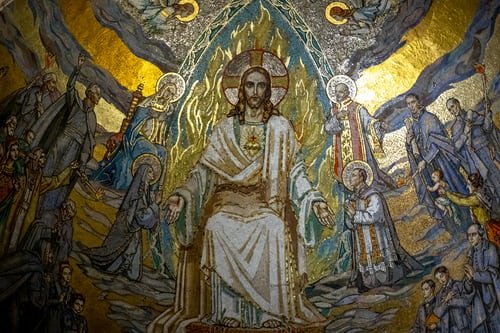For centuries, the concept of the Godhead has been central to Christian belief. From the doctrine of the trinity to the incarnation, there are many facets of this concept that explore God’s essence and attributes. In this blog post, we’ll dive into this fascinating topic and explore the different aspects of the Godhead. Whether you’re a theologian or simply interested in learning more about your faith, read on to discover more about this essential pillar of Christianity.
The Concept of Godhead in Christianity

Godhead is a complex concept in Christianity that refers to the divine nature or essence of God. This encompasses His attributes, such as omniscience, omnipotence, and omnipresence, among others. The concept of the Godhead is central to Christian theology and is essential in the understanding of the nature of God.
Exploring the Doctrine of the Trinity

The doctrine of the Trinity is a fundamental belief in Christianity that pertains to the triune nature of God. This means that there are three persons in one Godhead: the Father, the Son, and the Holy Spirit. These three persons are distinct, yet they share one divine essence or nature.
Understanding the Role and Attributes of the Father in the Godhead
In the Godhead, the Father is recognized as the first person and the source of all things. He is the creator, sustainer, and ruler of all. The Father is also known for His divine attributes like love, mercy, and justice. Understanding the role and attributes of the Father in the Godhead is crucial in comprehending His nature and character.
The Significance of the Son and the Holy Spirit in the Godhead
The Son, Jesus Christ, and the Holy Spirit are the other two persons in the Godhead. The Son is the second person, who became man in the incarnation and redeemed humanity by His death and resurrection. The Holy Spirit is the third person and is essential in the life and mission of the Church. Understanding the significance and role of the Son and the Holy Spirit in the Godhead enables us to appreciate their contributions to the eternal plan of God.
The Incarnation: God Becoming Man
The Incarnation is a critical concept in the Godhead that refers to the act of God becoming man. It is the foundation of Christian salvation and is an expression of God’s love for humanity. Through the Incarnation, Jesus Christ, the Son of God, took on human flesh and lived among us, showing us how to live a life pleasing to God. Understanding the depth of the Incarnation enables us to appreciate God’s ultimate sacrifice and love for us.
Practical Implications and Takeaways
The Godhead is not just a theological concept but has practical implications for our faith. It teaches us about God’s nature and character and helps us to understand His will for our lives. It reminds us of God’s sovereignty and love for humanity, which gives us hope and comfort amidst life’s trials. We, as Christians, are called to live in conformity to the Godhead and to emulate the divine attributes of love, mercy, and justice.
As we explore the concept of the Godhead in Christianity, we recognize that it is a complex and profound concept that goes beyond our limited understanding. Nevertheless, it is an essential belief that forms the foundation of Christian theology and guides our faith and practice.

Exploring the Doctrine of the Trinity
As a central belief in Christianity, the doctrine of the Trinity is a complex and nuanced concept that can be difficult to understand. However, at its core, the Trinity is the belief that there is only one God who exists in three distinct persons: the Father, the Son, and the Holy Spirit. This means that while each person of the Trinity is unique, they are all fully God and cannot be separated.
The doctrine of the Trinity can be traced back to the early days of Christianity when theologians were trying to make sense of what they saw as three distinct persons in the Bible: God the Father, Jesus Christ, and the Holy Spirit. While there are some who argue against the Trinity and view it as a form of polytheism, the vast majority of Christians throughout history have accepted it as a foundational belief.
One helpful way to think about the Trinity is to see it as a symbol of the relationship between God and humanity. Just as the three persons of the Trinity are distinct but unified, so too are God and humanity united in their relationship. The message of Christianity is that God loves humanity and has made a way for us to be in relationship with Him through Jesus Christ and the Holy Spirit.
In terms of practical implications, the doctrine of the Trinity helps us to understand God’s omniscience, omnipotence, and omnipresence. Because God is three persons in one, He is able to be present everywhere at once and knows all things. This can be a great comfort for those who feel alone or uncertain about the future.
Overall, while the doctrine of the Trinity is complex and can be difficult to grasp fully, it is a profound and foundational belief in Christianity. By helping us to understand God’s nature and our relationship with Him, it can provide us with hope and comfort in times of need.
The Father in the Godhead: Understanding His Role and Attributes
« Is Publix a Christian Company? Exploring the Grocery Chain’s Religious Affiliation
Is Forever 21 a Christian Company? Exploring the Brand’s Religious Roots »
When we talk about the Godhead in Christian theology, we cannot ignore the role played by the Father. In fact, the understanding of God as a loving Father is central to the Christian faith. Let’s take a closer look at the Father’s attributes and his role in the Godhead.
-
The Father in the Trinity
The doctrine of the Trinity teaches that there is one God in three persons: Father, Son, and Holy Spirit. This means that the Father is fully God, just as Jesus Christ and the Holy Spirit are. However, the Father is distinct from the other two persons, particularly in his role as the Creator and Ruler of the universe. -
Fatherly Attributes
The Father’s attributes reflect his unique role in the Godhead. For instance, he is often referred to as the source of all things. As the Creator, he gives life and sustains it. His love is also a key attribute, which is why he is often called the father of all believers. His love is perfect, unconditional, and sacrificial, which is demonstrated through Jesus’ death and resurrection. -
The Father and Human Relationships
Because we can understand God as a loving Father, we can learn much about healthy human relationships. For example, we learn that fathers should prioritize love, forgiveness, and self-sacrifice when interacting with their children. Children should also respect and obey their fathers, just as believers should respect and obey God. -
Our Response to the Father
Our response to the Father matters deeply, both in terms of our salvation and in how we live our lives. The Father invites all people to come to him and receive the gift of forgiveness through faith in Jesus Christ. Once we’ve accepted his invitation, we begin a lifelong journey of growing in our relationship with him.
In conclusion, the Father is an integral part of the Godhead in Christian theology. He is fully God, and his attributes reflect his role as the Creator and Ruler of the universe. Our understanding of him as a loving Father influences our relationships with him and with others. May we continue to grow in our understanding of the Father’s role in the Godhead and respond to him with love and devotion.
The Son and the Holy Spirit: Their Significance in the Godhead
As we explore the concept of Godhead in Christianity, it’s important we understand the significance of the Son and the Holy Spirit. Christianity teaches that God exists in three persons – God the Father, God the Son, and God the Holy Spirit, known as the Trinity.
The role of the Son, Jesus Christ, in the Godhead is crucial. He is described as the Word made flesh, who came to earth to save humanity from sin. He is fully God and fully human, and through his death and resurrection, he offers salvation to all who believe in him. Jesus is the mediator between God and humanity, and he is the ultimate example of God’s love and grace.

Similarly, the Holy Spirit is also an essential aspect of the Godhead. The Holy Spirit is the presence of God actively working in the world. He is the one who convicts people of their sin, comforts believers, and empowers them to live a life that glorifies God. The Holy Spirit guides and strengthens believers in their faith and is a source of wisdom and understanding.
Together, the Son and the Holy Spirit reveal the nature of God and complete the triune nature of the Godhead. This doctrine is unique to Christianity and is essential to understanding the divine nature of God.
The concept of the Trinity can be difficult to grasp, as it appears to be a contradiction of monotheism, the belief in one God. However, Christians believe that the Trinity is not three gods but three persons in one, each with their unique roles and attributes. It’s a mystery that cannot be fully understood, but a truth that is central to Christian theology.
Understanding the significance of the Son and the Holy Spirit in the Godhead is important for anyone seeking to deepen their faith in Christ. It’s through faith in the Son and the guidance of the Holy Spirit, that believers can experience the transformative power of God in their lives.
As we continue to explore the Godhead, let us remember the significance of the Son and the Holy Spirit. They reveal the character of God and invite us to join in a relationship with the one true God who is loving, just, and holy.

The Incarnation: Understanding the Concept of God Becoming Man
Have you ever stopped to think about the incredible concept of God becoming man? It’s a central idea in Christian theology, and it’s called the Incarnation. This doctrine is all about Jesus Christ, the Son of God, who was fully God and fully man at the same time. It’s a mind-bending and awe-inspiring truth that has significant implications for us as believers.
Here are some key points to help us understand the Incarnation:
-
Jesus Christ is both fully God and fully man.
The Bible teaches that Jesus was not just a good teacher or a prophet, but he was actually God in the flesh. This means that he had all the attributes of God: omniscience, omnipotence, and omnipresence. At the same time, he was fully human, with a body, a mind, and emotions just like ours. -
The Incarnation was necessary for our salvation.
Because of sin, we were separated from God and unable to save ourselves. But because Jesus was fully God, he was able to pay the price for our sin on the cross. And because he was fully man, he was able to represent us and offer himself as a sacrifice on our behalf. -
The Incarnation reveals God’s love for us.
The fact that God would become one of us shows just how much he loves us. He didn’t just send someone else to die for us, but he came himself to experience our pain and suffering. And because of his sacrifice, we can have a relationship with him and experience his grace and forgiveness. -
The Incarnation is a mystery that we can’t fully grasp.
Even though we can understand some of the implications of the Incarnation, it’s still a mystery that we can’t fully comprehend. We can’t explain how Jesus was both fully God and fully man at the same time. But we can trust in him and his work on our behalf, knowing that he is both fully God and fully man.
As believers, the Incarnation has practical implications for our lives. It means that we have a hope that goes beyond this world, and that we can trust in a God who understands us intimately. It also means that we are called to reflect Jesus’ love and compassion to others, just as he came to us in love.
Let us take some time to reflect on the incredible truth of the Incarnation, and to worship the God who loved us enough to become one of us.
The Godhead and Our Faith: Practical Implications and Takeaways

As Christians, our belief in the Godhead has practical implications for our everyday lives. Understanding the nature of our triune God – as the Father, Son, and Holy Spirit – affects the way we relate to God and to each other. Here are some practical takeaways:
-
Relationship with God: Having a personal relationship with God is at the core of Christianity. Our God is not distant or aloof; rather, He is intimately involved in our lives. As we come to know Him more deeply – through prayer, studying the Bible, and worship – we experience His love and grace in tangible ways. Recognizing the Trinity also helps us to avoid falling into the trap of worshipping different ‘versions’ of God, whether that be pantheism, polytheism, or other beliefs.
-
Relationship with others: Since the nature of our God is relational, we are called to reflect this in our relationships with others. This means loving our neighbors as ourselves, forgiving those who have wronged us, and seeking reconciliation where there is brokenness. The Holy Spirit empowers us to live selflessly and sacrificially as we follow in the example of Christ.
-
Understanding God’s attributes: The doctrine of the Trinity can help us to better understand some of the attributes of God, such as His omnipotence, omniscience, and omnibenevolence. We know that Jesus Christ was fully God and yet fully human, so we can relate to Him in a unique way. He has experienced our struggles and our pain and can empathize with us.
-
Eternal existence: The idea of an eternal God – one who has always been and always will be – may be difficult for us to fully comprehend. However, this understanding helps to give us perspective. When we go through trials or moments of stress, we can remember that our God is not bound by time or circumstance. He sees the bigger picture and is working all things together for our good.
In summary, the doctrine of the Trinity is not just an abstract concept to be debated by theologians. Rather, it has real-world implications for our lives as Christians. By understanding who our God is and how He works, we can live more fully and abundantly in relationship with Him and with others.


















